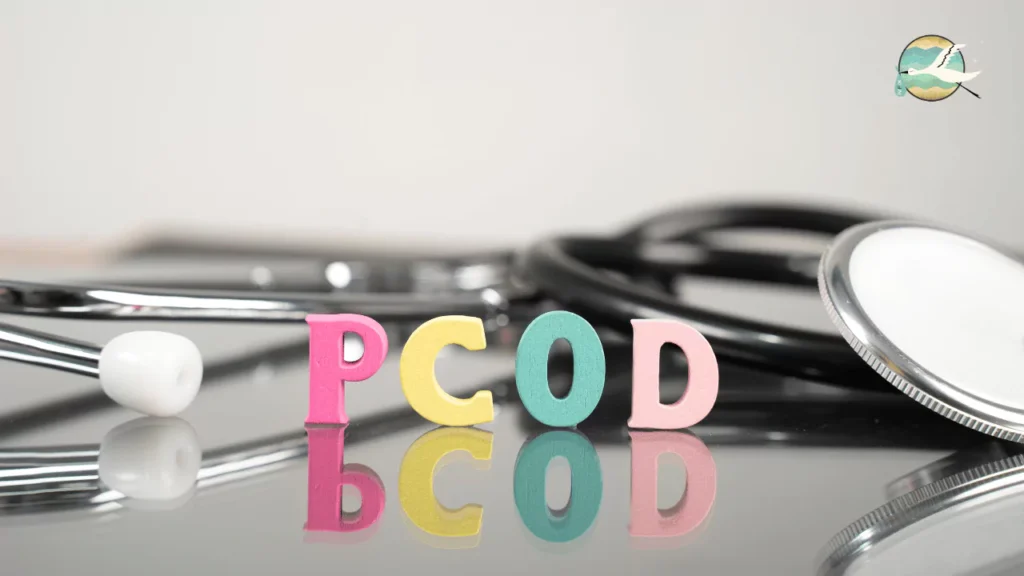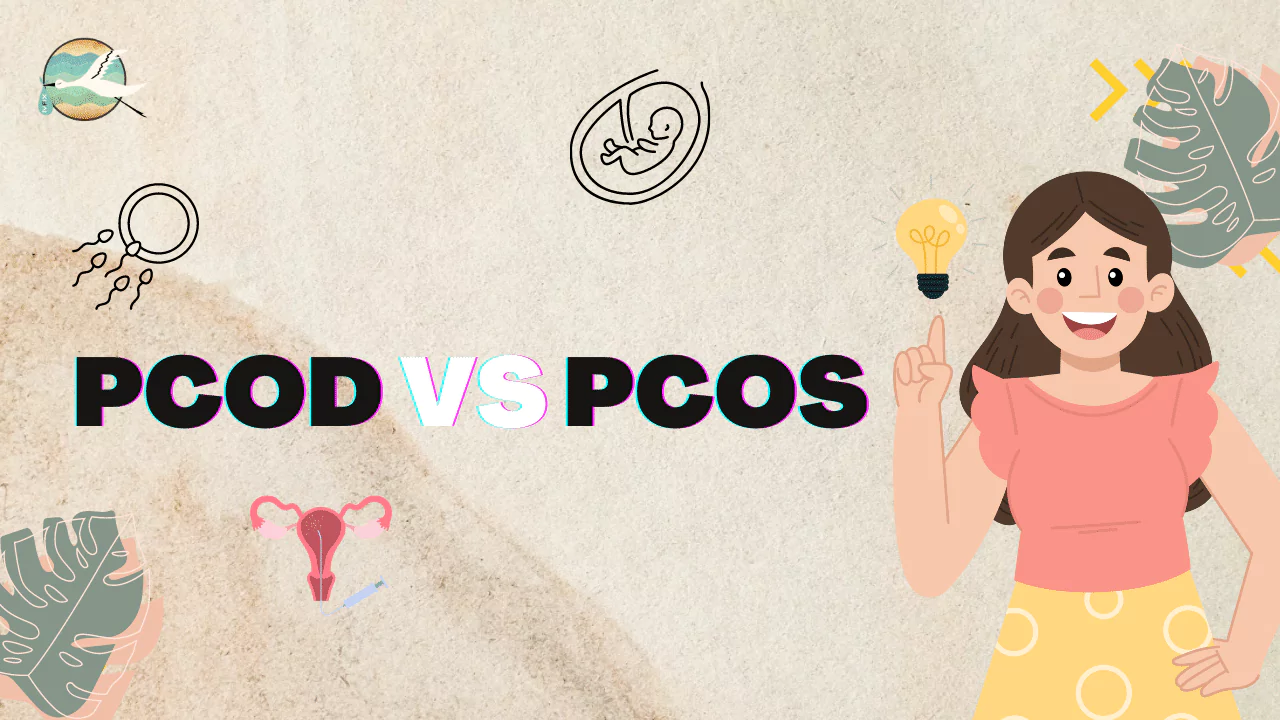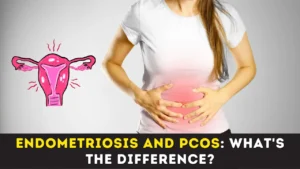Discover how PCOD vs PCOS is different from each other, two common hormonal conditions that affect women. In this thorough guide, learn about their signs, causes, and available treatments.
Polycystic ovary disorder (PCOD) and polycystic ovary syndrome (PCOS) are two of the most common issues in the complex and fascinating field of women’s health. Because of how similar their names sound and how frequently people use them interchangeably, these conditions frequently cause confusion. PCOD and PCOS, however, are different medical conditions with their own special traits and implications.
PCOD vs PCOS

We’ll explore the definitions, signs, causes, and treatment options of PCOD and PCOS in this article as we delve into the complex world of these conditions. By the end, you’ll have a thorough understanding of these conditions, enabling you to decide on your health in an informed manner or to assist those who are dealing with these hormonal disorders.
Table of Contents
PCOD vs PCOS: Key Differences
| Feature | PCOD | PCOS |
|---|---|---|
| Full Name | Polycystic Ovary Disorder | Polycystic Ovary Syndrome |
| Definition | A hormonal disorder characterized by enlarged ovaries with multiple small cysts. | A hormonal disorder resulting in enlarged ovaries with multiple small cysts. Additionally, it may involve metabolic issues and higher androgen levels. |
| Hormonal Imbalance | Yes | Yes |
| Presence of Cysts | Yes | Yes |
| Menstrual Irregularities | Yes | Yes |
| Androgen Levels | Normal or Slightly Elevated | Elevated |
| Metabolic Issues | Uncommon | Common |
| Impact on Fertility | May Affect Fertility | Often Affects Fertility |
| Associated Risks | Increased Risk of Diabetes and Cardiovascular Diseases | Increased Risk of Diabetes and Cardiovascular Diseases |
| Other Common Symptoms | Acne, Weight Gain, Hair Growth (Hirsutism) | Acne, Weight Gain, Hair Growth (Hirsutism) |
| Age of Onset | Usually after Menarche (First Period) | Reproductive Age (Late Teens to Early 40s) |
| Medical Diagnosis | Ultrasound and Hormonal Tests | Ultrasound and Hormonal Tests |
| Long-Term Health Concerns | Insulin Resistance, Type 2 Diabetes, Infertility, Endometrial Cancer | Insulin Resistance, Type 2 Diabetes, Infertility, Endometrial Cancer |
What is PCOD?

Polycystic ovary syndrome is a hormonal condition that mostly affects women of reproductive age. The disorder is characterized by enlarged ovaries that include numerous cysts, which are tiny sacs filled with fluid. These cysts may cause a variety of symptoms and health problems by interfering with hormone synthesis and the regular ovulation process.
What are the Symptoms of PCOD?
Polycystic ovary disorder symptoms might vary from person to person, however, they usually include:
- irregular menstrual cycles, such as those that are infrequent, heavy, or lengthy.
- Acne and hirsutism (unwanted hair growth on the face and body), both of which are caused by hormonal imbalances, are frequently brought on by excess androgen production.
- Gaining weight and having trouble losing it.
- Ovarian cyst-related pelvic discomfort or pain.
- difficulties conceiving or infertility.
What Causes PCOD?
Polycystic ovary disorder’s precise cause is unknown, but it is thought to be a result of a combination of genetic and environmental factors. The following are some possible causes and risk factors:
Insulin Resistance: Polycystic ovary disorder and insulin resistance are frequently linked, and elevated insulin levels can result. Hormonal imbalances are brought on by increased androgen production by the ovaries, which is influenced by high insulin levels.
Hormonal Imbalances: The normal ovulation process can be hampered by hormonal imbalances, including those in luteinizing hormone (LH), follicle-stimulating hormone (FSH), and androgens, which can also lead to the development of ovarian cysts.
Genetics: Women who have a family history of Polycystic ovary disorder are more likely to develop the condition, suggesting that Polycystic ovary disorder may have a genetic component.
Inflammation: The development of Polycystic ovary disorder may also be influenced by chronic inflammation in the body.
How is PCOD Diagnosed?
A thorough medical history review, physical examination, as well as a number of tests, such as the following, are frequently used by healthcare professionals to identify Polycystic ovary disorder.
Ultrasound: an ultrasound of the pelvic area to see the ovaries and look for cysts.
Hormonal Tests: Blood tests measure the levels of various hormones, such as androgens, LH, FSH, and others.
Other Tests: To rule out other conditions with comparable symptoms, additional tests may occasionally be performed.
PCOD Treatment Options
The goal of Polycystic ovary disorder treatment is to control symptoms, regain hormonal balance, and address particular issues like fertility problems. There are various treatment options available, such as:
Lifestyle Changes: A healthy lifestyle that incorporates a balanced diet, regular exercise, and stress reduction can have a big impact on Polycystic ovary disorder symptoms.
Medications: Menstrual cycle regulation and androgen level reduction can be achieved with the aid of hormonal contraceptives, such as birth control pills. To treat hirsutism and acne, doctors may prescribe other drugs, such as anti-androgens.
Fertility Treatments: Ovulation induction is one fertility treatment that may be suggested for women who are trying to get pregnant.
Surgery: An operation called ovarian drilling may be carried out in some situations where cysts are large and cause a lot of discomfort.
It’s crucial to keep in mind that Polycystic ovary disorder is a chronic condition that requires ongoing commitment and teamwork with medical experts to manage.
What is PCOS?

PCOS, or polycystic ovary syndrome, is a hormonal condition that affects women who are of reproductive age. Similar to PCOD, PCOS is characterized by enlarged ovaries that contain numerous small cysts. However, PCOS also involves metabolic issues, and androgen levels in women with PCOS are frequently higher than average.
What are the Symptoms of PCOS?
PCOS symptoms can vary greatly and may include:
- Menstrual irregularities, such as irregular, heavy, or absent periods, are comparable to those seen in Polycystic ovary disorder.
- Acne, hirsutism (excessive hair growth), and male-pattern baldness are examples of androgen-related symptoms.
- Insulin resistance is frequently linked to weight gain and challenges with weight loss.
- The term “acanthosis nigricans” refers to a variety of skin conditions, including skin darkening in specific areas.
- Mood swings and fatigue.
What Causes PCOS?
Although the precise cause of PCOS is unknown, it is likely influenced by a mix of genetic and environmental factors, similar to PCOD. Following are a few potential causes and risk factors:
Insulin Resistance: Because it causes higher androgen levels and upsets hormone balance, insulin resistance is a major factor in PCOS.
Hormonal Imbalances: Hormone imbalances involving LH, FSH, insulin, and androgens are linked to PCOS.
Inflammation: Hormone imbalances and insulin resistance may both be impacted by chronic inflammation in the body.
Genetics: PCOS is more likely to affect women who have a family history of the condition.
How is PCOS Diagnosed?
A thorough assessment of the symptoms, medical background, and laboratory tests is required to diagnose PCOS, and these tests may include:
Ultrasound: to check for cysts, an ultrasound of the ovaries is performed.
Hormonal Tests: Blood tests to determine the levels of various hormones, such as androgens, LH, FSH, insulin, and others.
Glucose Tolerance Test: This test aids in determining blood sugar levels and insulin resistance.
Other Tests: To rule out alternative conditions, additional tests might be required in some circumstances.
PCOS Treatment Options
The goal of PCOS treatment is to manage symptoms, address underlying hormonal imbalances, and lessen the likelihood of developing long-term health problems. Typical forms of treatment include:
Lifestyle Changes: PCOS symptoms can be significantly reduced by living a healthy lifestyle that includes a balanced diet, regular exercise, and stress reduction.
Birth Control Pills: Menstrual cycles and androgen levels can be regulated with the aid of hormonal contraceptives.
Anti-Androgen Medications: These medications help in the treatment of acne and hirsutism.
Metformin: Women with PCOS may be given the type 2 diabetes drug metformin to increase their insulin sensitivity.
Fertility Treatments: In-vitro fertilization (IVF) or ovulation induction may be suggested for women who are trying to get pregnant.
ICSI – Intracytoplasmic Sperm Injection: Enhancing Fertility with Advanced Reproductive Technology 2023
FAQs about PCOD vs. PCOS
Q: Are PCOD and PCOS the same thing?
PCOS and PCOD are not the same thing, no. Ovarian cysts and hormonal imbalances are similarities they both share, but PCOS also has metabolic problems and higher androgen levels, which are not typical of PCOD.
Q: Can PCOD or PCOS be cured completely?
PCOS and PCOD have no known treatments as of yet. However, many women can successfully control their symptoms and lead fulfilling lives with the right management and lifestyle adjustments.
Q: Is PCOD or PCOS linked to weight gain?
Due to hormonal imbalances and insulin resistance, PCOD and PCOS are both linked to weight gain. Symptoms may be better controlled by maintaining a healthy weight through diet and exercise.
Q: Can PCOD or PCOS cause infertility?
Yes, both PCOD and PCOS can affect a woman’s ability to conceive. Ovulation disruption and hormonal imbalances may make it difficult for some women to get pregnant. However, many PCOD or PCOS-afflicted women can conceive when given the right care.
Q: Are there any natural remedies for PCOD and PCOS?
The symptoms of PCOD or PCOS can be managed with certain lifestyle changes, such as a balanced diet, regular exercise, and stress reduction, even though there are no specific natural treatments that can cure PCOD or PCOS.
Q: Are women with PCOD or PCOS at higher risk of other health conditions?
It is true that women with PCOD or PCOS are more likely to suffer from diseases like type 2 diabetes, heart disease, and endometrial cancer. To reduce these risks, regular medical checkups and healthy living are crucial.
Conclusion
In conclusion, it’s critical for both women and medical professionals to comprehend the distinctions between PCOD and PCOS. While PCOS includes additional metabolic problems and higher androgen levels, PCOD is characterized by enlarged ovaries with numerous small cysts. Both conditions can cause menstrual irregularities, hormonal imbalances, and fertility problems, but many women can effectively manage their symptoms and enhance their quality of life by receiving the right medical attention and making lifestyle changes.
Women can take proactive measures to address PCOD and PCOS and improve their health and general well-being by staying informed and seeking timely medical advice.





[…] PCOD vs PCOS: How Are They Different? 2023 […]
[…] PCOD vs PCOS: How Are They Different? 2023 […]
[…] also known as polycystic ovary syndrome, is a hormonal condition that affects women’s reproductive systems. It is characterized by […]
[…] PCOD vs PCOS: How Are They Different? 2023What Fertility Treatment is Best for PCOS?Does Female Masturbation Increase Fertility? […]
[…] is important to comprehend its intricacies. In this post, we will look at the four basic forms of PCOS and provide in-depth information on each. We will go over their distinguishing features, symptoms, […]